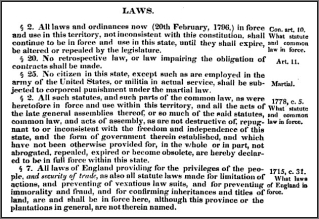It really is our common heritage
So… The Legal Genealogist knows it sounds like a broken record sometimes.
To understand the records, we have to understand the laws at the time and in the place where the records were created.
 Which is why I keep stressing that we have to go back and understand English common law as well as the laws created here in the United States.
Which is why I keep stressing that we have to go back and understand English common law as well as the laws created here in the United States.
Because we didn’t just inherit a legal tradition from the English.
We adopted huge chunks of English law, lock stock and barrel, both in colonial times and as we became states and joined together as a nation.
Poking through some Tennessee statute books as I prepared for this weekend’s seminar with the Tennessee Genealogical Society,1 I came across a really clear example of just what I mean here.
It’s set out in a section entitled “Laws” in an 1831 collection of the laws of the then 35-year-old State of Tennessee that included the colonial and territorial laws that continued in effect at that time.2 And there are three key provisions that tell the tale.
In 1715, the laws of what later became Tennessee provided in part that:
All laws of England providing for the privileges of the people, and security of trade, as also all statute laws made for limitation of actions, and preventing of vexatious law suits, and for preventing immorality and fraud, and for confirming inheritances and titles of land, are and shall be in force here, although this province or the plantations in general, are not named therein.3
And what did the laws of England consist of at the time? Oh, there were statutes galore, for sure — passed by Parliament, approved by the monarch. But then there was the common law. So many concepts of basic law that — through this language — came into the law of what became Tennessee.
But, you might think, surely we threw that away later and went our own way at the time of the Revolution! And in part we did. But not completely.
Here’s what the laws of what became Tennessee said at the time of the Revolution:
All such statutes, and such parts of the common law, as were heretofore in force and use within this territory, and all acts of the late assemblies thereof, or so much of the said statutes, common law, and acts of assembly, as are not destructive of, repugnant to or inconsistent with the freedom and independence of this state, and the form of government therein established, and which have not been otherwise provided for, in the whole or in part, not abrogated, repealed, expired, or become obsolete, are declared to be in full force within this state.4
See? We still followed English common law and made it part of our law, unless it undermined our new-found freedom or we specifically said otherwise.
Oh, but of course Tennessee would have done its own thing, so to speak, when it became a state, wouldn’t it?
It did, in adopting its constitution of 1796, but, in that wonderful document, it said this:
All laws and ordinances now (20th February, 1796) in force and use in this territory, not inconsistent with this constitution, shall continue to be in force and use in this state, until they shall expire, be altered or repealed by the legislature.5
And that, my friends, is total incorporation of English common law into the law of the new State of Tennessee, to the extent that the legislature hadn’t — then or thereafter — said otherwise.
And that’s why we need to know what the common law was — because it was and is a common element of our legal heritage. It informed and controlled the actions of our ancestors and the decisions of the courts and authorities they dealt with every day.
The English common law?
Common to us, too.
SOURCES
- Will I see you there? Hope so! You can find information here. ↩
- “Laws,” in John Haywood and Robert L. Cobbs, revisers, The Statute Laws of the State of Tennessee (Knoxville, Tenn. : J. F. Heiskell, printer, 1831), 1: 676; digital images, Google Books (http://books.google.com : accessed 16 Oct 2014). ↩
- Ibid., Laws of 1715, c.31. ↩
- Ibid., Laws of 1778, c.5. ↩
- Ibid., Section 2, Article 10, Constitution of 1796. ↩


